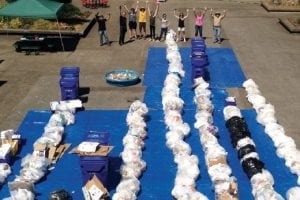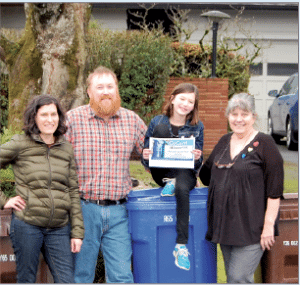 In the Portland, Ore. metropolitan area, no municipal recycling program is an island. Each works with its neighboring communities as part of a regional “wasteshed,” sharing diversion goals, tactics and resources.
In the Portland, Ore. metropolitan area, no municipal recycling program is an island. Each works with its neighboring communities as part of a regional “wasteshed,” sharing diversion goals, tactics and resources.
Gresham, Ore. attributes its diversion achievements over the years in part to the interconnected nature of recycling programs in the state. As a community of 112,000 residents in the Portland metropolitan area, Gresham has collaborated with and learned from its neighbors in efficiently managing waste in a variety of sectors.
“The local governments within the Metro region all work together, we all share the same resources and support each other,” said Shannon Martin, solid waste and recycling program manager for the city of Gresham. “It’s a great partnership.”
Gresham has five franchised haulers that handle residential and commercial recycling. Each hauler covers a specific zone in the city. There are no materials recovery facilities (MRFs) located in Gresham, so the city’s haulers move material to a number of nearby MRFs in the region, including facilities owned by Far West Recycling, WestRock, Waste Connections and others.
Working together to promote diversion
Gresham is one of 24 cities and three counties that work with Metro, the regional elected government. When it comes to waste and recycling, Oregon has 35 individual wastesheds, each with its own recovery rate and goal, and the greater Portland tri-county area is designated as the Metro wasteshed by the state’s Department of Environmental Quality.
Metro controls the flow of waste material throughout the Portland metro area, and it brings the regional stakeholders together. Solid waste directors from each jurisdiction within Metro meet together regularly, discussing how they can better collaborate on projects and update one another on progress.
In 2016, the Metro wasteshed achieved a recovery rate of 47.8 percent. As a region, Metro has a legislated 2025 goal of hitting 64 percent diversion.
“Cities don’t tend to do their own diversion rates. We all get pulled in together as the Metro region, and DEQ provides the recovery level for us,” Martin said. “It’s a little unique compared to other places.”
The wasteshed system also allows programs to work together on focus projects. As an example, Shaunna Sutcliffe, Gresham’s residential recycling coordinator, pointed to the city’s work promoting “repair cafes.”
Nearby Portland launched the cafes, which provide a space for people to come and fix their belongings. The project reflects a goal in Gresham and in the region of incorporating repair and reuse into the materials management discussion, moving the conversation beyond solely recycling.
By coordinating with other communities in the region, in 2017 the metropolitan area held 29 repair cafe events, providing a convenient option at least once per month somewhere in the region.
“That all couldn’t happen if we weren’t all constantly collaborating with the meetings at Metro and sharing information and resources,” Sutcliffe explained.
Commercial focus
Gresham’s commercial recycling program started more than 20 years ago, and the city has placed a strong emphasis on its business recycling customers over the years.

The Novak family won a year of free garbage collection as part of a campaign highlighting Gresham’s Recollect Garbage Day reminders. In the program, participating residents receive messages via email, text or tweet telling them it’s time to put their carts at the curb.
Gregg Hayward, Gresham’s business sustainability outreach coordinator, works with the business community to support recycling efforts in a variety of ways. For instance, the city holds a monthly coffee hour, bringing businesses together to gauge how certain initiatives are working.
The city has also established a Green Business Certification program that signifies businesses have certain practices in place to promote resource efficiency. It includes a number of components, including recycling, waste reduction and composting. Businesses in the program take steps such as providing clear signage and easy recycling access. There are currently 70 businesses certified in the city, and the initiative has had 200 participants over the years.
“We’re working to help businesses build upon the knowledge they internally have on sustainability, and then help them connect with other businesses,” Hayward explained. The coffee hour meetings serve as a way to train businesses, who can in turn train other businesses and get them interested in promoting resource efficiency efforts.
The Metro partnerships have helped bolster commercial recycling as well. For example, the entire Metro area moved to a food-only commercial compost system in an effort to develop consistency among jurisdictions and provide a cleaner stream for the region’s organics processor.
“We get to, as a whole, move the needle further forward because we’re working on a larger scale with more businesses and on a policy that’s more consistent,” Hayward said.
Reducing contaminants
Like many communities, Gresham is currently working to reduce contamination in its single-stream system. The city collects glass curbside in a separate bin, which helps ensure glass and other recyclables don’t contaminate one another.
Gresham is also working on a cart-tagging project, using materials made available by The Recycling Partnership. Clackamas County, a neighboring jurisdiction, completed a similar project before Gresham. Thanks to the regular meetings and communication between leaders in the region, Gresham officials got to hear about the other program’s experience with the project.
“We were able to have a local partner help us with knowing what we could do differently, before we started the project,” Martin said.
For Gresham’s project, the city is bringing in two paid interns who will go out into the community during the summer and tag carts. The city has mapped out and planned different target zones using GIS software.
The cart inspectors will be focusing on plastic bags, foodservice packaging (including coffee cups and clamshell containers), and otherwise recyclable materials that are bagged inside the cart.
This article originally appeared in the August 2018 issue of Resource Recycling. Subscribe today for access to all print content.
Think your local program should be featured in this space? Send a note to [email protected].

